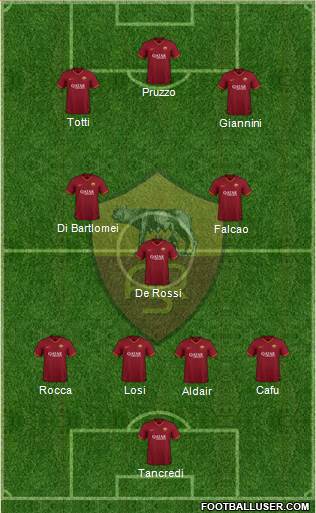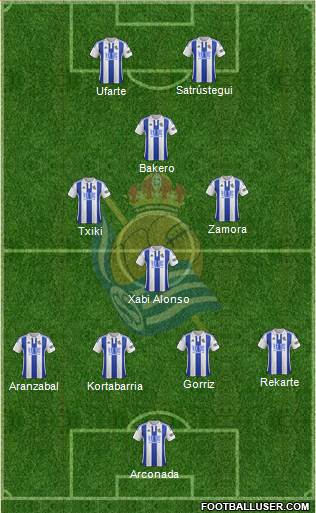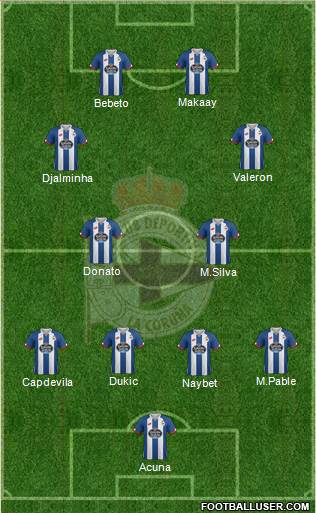 |
| 1982-1983 Scudetto winner |
AC Milan, Juventus, Inter Milan,
Roma, Lazio, Torino, Napoli, Fiorentina,
Sampdoria, Geona, Bologna, Parma, Udinese, Brescia.
AS Roma All-Time Team for Italian Players
AS Roma All-Time Team for Foreign Players
This is my selection of a 25 member all-time team for the club. The number 25 was chosen because it is the official squad size for the Champions' League.
AS Roma have won Serie A three times, first in 1941–42 then in 1982–83 and again in 2000–01, as well as winning nine Coppa Italia titles and two Supercoppa Italiana titles. On the European stage Roma won an Inter-Cities Fairs Cup in 1960–61, coming close to European Cup victory in 1983–84 (lost the one-legged final played at home against Liverpool), and finishing as runners-up in the UEFA Cup for 1990–91 (two-legged aggregate defeat against Internazionale). Therefore, Roma is the fourth Italian club by major honours won, behind Juventus, Milan and Inter, and it is considered one of the Seven Sisters of Italian football.
 |
| 2007 Supercoppa |
GK: Franco Tancredi (Italy)
Franco Tancredi began his career with Giulianova, and later also played with Milan and Rimini, before joining Roma in 1977. He was long-time keeper for Roma. He played for them between 1977 and 1990, winning the league in the 1982-1983 season. He is a member of the A.S. Roma Hall of Fame. He played a single season with Torino before retiring. He was capped 12 times. He went to the World Cup Finals in 1986.
 |
| Franco Tancredi |
GK: Guido Masetti (Italy)
Born in Verona, Italy, Guido Masetti played for Hellas Verona and AS Roma from 1926 to 1943. For the Italian national team, he was merely used as a stand-in for Gianpiero Combi and Aldo Olivieri. He had two caps. Masetti was a part of the teams that won two World Cups in 1934 and 1938 without playing in any of the matches.
GK: Fabio Cudicini (Italy)
Fabio Cudicini played Udinese, Roma, AC Milan and Brescia. He was remembered for his two stints with AC Milan. Between 1967 and 1972, he played for AC Milan. He helped Milan to win the 1969 European Cup. Before Milan, he played for Roma and Udinese. He won the Inter-Cities Fair Cup with Roma. He was playing in the same generation as Dino Zoff, Lozenzo Buffon and Enrico Albertosi. He was uncapped.
Christian Panucci's breakout season was the season 1993-1994, when he played 19 games for AC Milan and won the 1994 UEFA Champions' League. The highlight of his career was perhaps his three seasons with Real Madrid. He helped them to win the UEFA Champions' League in 1998. His longest stint was, however, with AS Roma. At the international level, he had 57 caps with Italy, but his career was very rocky. He never secured a regular place with the team.
RB: Cafu (Brazil)
Cafu is the all-time cap record holder for Brazil with 142. He is the only man to play in three World Cup Finals, winning in 1994 and 2002. He was the captain of the national team as they won the World Cup in 2002. With Brazil, he also took part in four editions of the Copa América, winning the title twice, in 1997 and 1999. He played with Sao Paulo, Real Zaragoza, Juventude, Roma, Palmeiras and AC Milan. He was South American Player of the Year in 1994.
SW: Giacomo Losi (Italy)
Giacomo Losi was considered one of the greatest player who ever played for AS Roma. He earned his nickname "the Heart of Roma", during a match against Sampdoria in which Losi kept playing despite being injured. He later scored the winning goal from a corner kick. He held Roma's all-time appearance record until Francesco Totti broke it in 2007. He won Inter-Cities fairs Cup in 1960-61. For Italy, he was capped 11 times. Two of his caps came at the 1962 World Cup Finals.
 |
| Gaicomo Losi |
Sergio Santarini played for Rimini, Internazionale, Roma, and Catanzaro. He spent 13 seasons with AS Roma, where he made his name. He won three Italian Cups in 1969, 1980 and 1981. At the international level, he had two caps for Italy in 1971 and 1974. He was elected into Roma's Hall of Flame in 2015.
Samuel began his career with Newell's Old Boys in 1996, moving to Boca Juniors year later. In Europe, he played with Roma, Real Madrid and Inter Milan. With Inter Milan, he won five consecutive Serie A titles; he played a key role in the club's treble success in the 2009–10 season, partnering with Lúcio in defence under José Mourinho. At international level, he has over 50 caps for Argentina, representing his country at two World Cups.
CB: Aldair (Brazil)
Aldair played for Flamengo before heading to Europe. He started with Benfica, but he was widely remembered for his 13 seasons with Roma. He was a member of the scudetto winning team in 2001. He was nicknamed "Pluto" by Roma fans. The club retired his #6 jersey for 10 seasons. For the national team, he had 80 caps. He was a key member of the great defensive unit of the World Cup winning team in 1994. In addition, he also played in the World Cup Finals 1990 and 1998.
 |
| Aldair |
LB/RB/CB: Sebcastiano Nela (Italy)
Sebcastiano Nela could play as a left back, rightback and sweeper. He began his career with Genoa in 1978. He joined Roma in 1981 from Geona. He was a part of the great team that won the Serie A title in 1982-83 and 3 Italian Cups. He later played briefly for Napoli. Nela was capped 5 times for Italy and went to the 1986 World Cup Finals in Mexico.
At the time of writing, Daniele De Rossi has played his entire career with Roma. De Rossi inherited the captaincy of Roma at the start of the 2017–18 season following the retirement of Francesco Totti. He was an important player for Italy since making his national debut in 2004. He went to every major international tournaments. He had 117 caps after his retirement from the national team in 2017. He was a member of the 2006 World Cup winning team. He was Italian Footballer of the Year in 2009.
 |
| Daniele De Rossi |
Fulvio Bernardini played Lazio and and Inter Milan before spending 9 seasons with Roma. At the end of his career, he played for M.A.T.E.R. He had 26 caps for Italy from 1926 to 1932 at the international level. He was a member of the 1928 Italian Olympic team that won a bronze medal. He was one of the first players elected to Roma's Hall of Flame.
CM: Carlo Ancelotti (Italy)
Carlos Ancelotti began his career with Parma, but he made his name with AS Roma. He won the Serie A title in 1982-1983 and 4 Italian Cup's. In 1987, he joined AC Milan and became a part of the team that won two European Cups. The team is considered one of the greatest club sides in history. He was capped 26 times. He narrowly missed the WC Finals in 1982, but went to Mexico 1986 and 1990.
AM/CM: Agostino Di Bartlomei (Italy)
With Roma, Di Bartlomei formed a midfield partnership with Falcao in the mid-1980's. He was a part of the great team that won the Serie A title in 1982-83 and 3 Italian Cups. He is considered to be one of the greatest footballers in Roma's history. However, he was uncapped. In 1984, he moved A.C. Milan. After three seasons he left Milan and his career fizzled out after playing for Cesena and Salernitana. He is a member of the A.S. Roma Hall of Fame.
 |
| Agostino Di Bartlomei |
At one point, Falcao was the world's highest paid footballer. He played with Internacional at home before becoming the star of Roma in the 1980's, winning the Serie A in 1982-83. In 1985, he returned home and played for Sao Paulo. For the national team, he was a key player for the fantastic Brazilian of Spain 1982. He won the Silver Ball in Spain. He also went to the World Cup Finals in 1986.
 |
| Falcao |
Bruno Conti was the greatest winger in Italy's history. He was a star player as Italy won the World Cup in 1982 and also took part at the 1986 World Cup Finals. Except with two loan spells with Genoa, he played his entire career with AS Roma. The season after the World Cup Finals in 1982, he helped Roma to win the league title. He also led them to the 1984 European Cup Final but were defeated on penalties by Liverpool.
RW: Alcides Ghiggia (Uruguay)
Alcides Ghiggia played for the national sides of both Uruguay and Italy during his career. He was known for scoring the winning goal against Brazil in the 1950 World Cup Finals that sealed the World Cup for Uruguay. The match was known as the "Maracanazo". He also played for the club sides of the Peñarol and Danubio in Uruguay and A.S. Roma and A.C. Milan in Italy.
AM/LM: Francesco Totti (Italy)
Totti was the long serving captain of Roma and perhaps the greatest ever player for the club. He brought the scudetti back to Roma in 2001 after a 20 year drought. He was named the Italian Footballer of the Year for 2000 and 2001. He won the European Golden Boot award in 2006-2007. A 2006 World Cup winner and Euro 2000 finalist with Italy, Totti was selected in the All-Star team for both tournaments; he also represented his country at the 2002 World Cup and Euro 2004.
 |
| Francesco Totti |
Nicknamed "Il Principe" (The Prince), Giuseppe Giannini was a symbol of Roma before the emerge of FrancescoTotti. He played for AS Roma between 1982 and 1996. After AS Roma, he played in Austria for Sturm Graz, and for Napoli and Lecce in Italy. At the international level, Giannini was capped 47 times for Italy between 1986 and 1991, scoring 6 goals. He represented Italy at both Euro 1988 and the 1990 World Cup Finals hosted by Italy.
 |
| Giannini "Il Principe" Giannini |
Marco Delvecchio started with Inter Milan, but went through several clubs before settling with AS Roma in 1995. He played 10 seasons winning the 2000-2001 league there. At the international level, he represented Italy on 22 occasions between 1998 and 2004, scoring 4 goals, taking part at UEFA Euro 2000, reaching the final of the tournament, in which he scored, and at the 2002 FIFA World Cup.
ST: Vincenzo Montella (Italy)
Montella played for Italian clubs Empoli, Genoa, Sampdoria and Roma, and also had a spell on loan in England with Fulham. His best years were spent with Roma, where he scored many, important goals, despite having conflicts with Coach Fabio Capello. He won won the Serie A title and the Supercoppa Italiana during the 2000–01 season. For Italy, he went to Euro 2000 and the WC Finals in 2002, but saw limited action.
ST: Amadeo Amadei (Italy)
Known as the "Eight King of Rome", Amadei made his Serie A debut in 1937 as a 15 years old. He became the youngest ever scorer a week later when he scored against A.S. Lucchese Libertas 1905, a record still held today. He won the Serie A in 1941-42. He also played for Atlanta, Inter Milan and Napoli. He went to the World Cup Finals in 1950.
ST: Roberto Pruzzo (Italy)
Pruzzo made his senior debut for Genoa in 1973, winning the Serie B title during the 1975–76 season, as well as the top scoring award. He went to Roma in 1979, for the then record sum of 3 billions liras. He became one of the most effective Italian strikers of the 1980s, winning one scudetto during the 1982–83 season, and four Italian Cups in 1980, 1981, 1983, and 1986. He also won the Serie A top scorer award three times, in 1981, 1982, and 1986. For Italy, he was capped 6 times and went to Euro 1980.
 |
| Roberto Pruzzo |
Simone Perrotta (Italy), Damiano Tommasi (Italy), Ubaldo Righett (Italy), Philippe Mexes (France), Walter Samuel (Argentina), Gabriel Batistuta (Argentina), Rudi Voller (Germany), Abel Balbo (Argentina), Rodolfo Volk (Italy), Arne Selmosson (Sweden), Pedro Manfredini (Argentina), Francesco Graziani (Italy), Alberto Ginulfi (Italy), Paolo Conti (Italy), Pierluigi Pizzaballa (Italy), Doni (Brazil), Giorgio Carpi (Italy), Arcadio Venturi (Italy), Mancini (Brazil), Luigi Di Buagio (Italy), Emerson (Brazil), Zbigniew Boniek (Poland), Edin Dzeko (Bosnia and Herzegovina), Vincent Candela (France), Toninho Cerezo (Brazil), Radja Nainggolan (Beglium), Amedeo Carboni (Italy).
Squad Explanation
-- In recent years, AS Roma had three loyal players who spent most of their prime career with them. In the modern era, it is difficult to keep players on the same team for a club liked AS Roma. They are Giuseppe Giannini, Francesco Totti and Daniele De Rossi. Bruno Conti also played his entire career with AS Roma, except for a loan deal.
-- AS Roma won the 1982-1983 scudetto. It was an era when the best players in the world joined Serie A. Falcao, Agostino Di Bartlomei, Roberto Pruzzo, Bruno Conti, Franco Tancredi, Carlo Ancelotti, Giuseppe Giannini and Sebcastiano Nela. Toninho Cerezo just missed out on this all-time team. Giuseppe Giannini was a young player on the team.
-- The code of the team reached the 1984 European Cup Final before losing to Liverpool.
-- AS Roma won another Serie A title in the 2000-2001 season. Francisco Totti, Vincenzo Montella, Marco Delvecchio, Cafu, Aldair and Vincent Candela made my all-time team.
 |
| 2000-2001 Serie A Title |
-- So I have Franco Tancredi and Guido Masetti as my first two goalkeepers. The third keeper was between Alberto Ginulfi, Fabio Cudicini, Paolo Conti, Pierluigi Pizzaballa and Doni. I took Fabio Cudicini because he was probably the most well-known.
-- Because Sebcastiano Nela could play as a centerback and a left back, I have the options of taking a left back or a centerback for the last defensive player. For centerbacks, I was looking at Ubaldo Righett, Philippe Mexes and Walter Samuel. I selected Samuel.
-- Roma also had too many great central midfielders. I took Carlos Ancelotti, Falcao, Agostino Di Bartlomei , Daniele De Rossi and Attilio Ferraris. I have no more spot for Simone Perrotta, Damiano Tommasi and Toninho Cerezo. All of the players deserved a space on the 25 team.
 |
| 2022 Conference League winner |






















